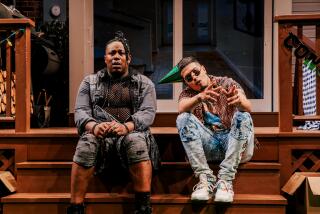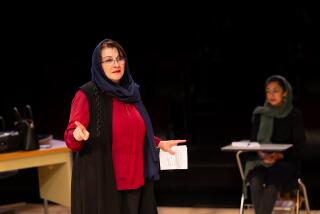Adopting a superior pose
- Share via
London — Lately, world politics have been cropping up in various guises in the London theater -- from the West End hit “The Madness of George Dubya” to the Iraq references in Nicholas Hytner’s production of “Henry V” at the National Theatre. Meanwhile, a sharp new comedy at the Hampstead Theatre in North London, “US and Them,” explores the complex dance of friendship and the battle of egos between the British and the Americans.
As a critic for the Times of London wrote, “Relations between Britain and America have never been better -- and never worse. Britons have not hated Americans so passionately since 1776. Americans are Britain’s beloved allies.”
“US and Them” is not a political manifesto, however, but a comedy of manners. And in its bourgeois universe, the “us” and the “them” have as much to do with the divisions between men and women, husbands and wives, and parents and children, as with those between nations. Nevertheless, director Jennie Darnell says that by dissecting the souring friendship between a British and an American couple-- whose twentysomething children end up running off together -- “US and Them” illuminates not how we are separated, as the adage goes, by a common language, but how we are united by our competing senses of superiority.
“What I’ve always enjoyed about the play is that it takes two cultures who both feel superior for different reasons and puts them next to each other,” Darnell says one morning in the theater’s light-filled cafe. When Brits Martin (Hugh Bonneville) and Charlotte (Siobhan Redmond) and Americans Ed (Matthew Marsh) and Lori (Harriet Walter) first meet, they are enchanted by one another’s superficial charms and struck by how much they seem to have in common, leaving their kids to make jokes about such cliches as bad English teeth and American incompetence at geography. But the play chronicles their subsequent falling-out with a complicated regard that led one London reviewer to call the relationship “vexed” and another to describe it as “doomed.”
“I started writing the play about 18 months ago, and it became clear to me that there is no dramatic virtue in comparing a redneck, Bush-supporting American with a liberal English person,” playwright Tamsin Oglesby says by phone. “That’s too easy. That’s the stuff of satire, and it lasts five minutes and it’s very satisfying -- like candy -- and ultimately, the people who like it I think are converted anyway.”
Instead, Oglesby took upper-middle-class people from both sides of the Atlantic and portrayed them slowly driving one another mad, but not for the usual reasons.
“I really wanted to transpose what we might rather smugly think of being English characteristics with American characteristics, whilst remaining true to both countries and true to the characters,” she says. “So the English couple are not intellectual and cultured and sophisticated and urbane by any means. And I wanted to give the Americans a much larger degree of intellectual and philosophical breadth than we generally think that Americans have, to be honest.”
The Americans in Oglesby’s play do not come off as ignorant or unworldly or unquestioningly nationalistic, just as pious, over-manicured, rule-bound ideologues bent on making a buck -- while their sex and family lives fade eerily into the background. Although Americans are routinely called racist by their European friends, it’s the English character of Martin who is racist here, mistaking a Korean American for a Japanese man and using race as an insult when he doesn’t get his way with shopkeepers and the like.
While the Americans are painted in the play as generous, hospitable and openhearted, the Brits are (albeit witty and human) hypocrites who fall in love with the smell of money on their first visit to the Americans’ lush New York apartment and will do anything to court the people who might help them make a bundle of their own.
The play begins with the American couple announcing to their British friends that they plan to end the friendship. It then proceeds to trace the history of the fallout in flashback. At first, the earnestness with which the Americans seek to end the relationship is as much a source of irony as the hypocritical nature of the British, who choose to deal with such messy emotions behind their friends’ backs. But by the end, the Brits are accusing the Americans of “dropping bombs on everyone who isn’t like you,” of living in a country run according to an “arbitrary set of self-regulating, self-serving made-up laws that allow rich people to get away with murder while everyone else has to watch them on television,” and of failing to see that Sept. 11 was a demonstration that America’s actions have “consequences.”
The Americans accuse the Brits of living on a “dirty little island” with a “collapsing infrastructure, rude, incompetent, ugly people and [a craven] prime minister.” That charge is followed, of course, by the British retort that “at least we elected our [craven] prime minister” -- a remark that, even this many months after the fateful Supreme Court decision, brought down the house at a recent matinee.
U.S. production envisioned
Thanks to enthusiastic sold-out audiences, “US and Them” has been extended through Saturday, and the producers are hoping for an eventual West End transfer. But they say they are hoping most of all to see the show staged in the U.S.
“It would be very interesting to see how this played in America, to see where the laughter was,” Darnell says.
Speaking of the British characters in the play, Oglesby says: “I have English people saying, ‘But they’re funny.’ Why are they funny? Because if you analyze it, they’re not very attractive, the English couple.”
Oglesby says that British audiences have no problem recognizing the national character as “sniping, mean, opportunistic, snobbish and hypocritical,” but that they fail to see those qualities as “significant failings.” She says they are quick to laugh at Americans’ self-confidence and praise Britons’ ability to laugh at themselves.
“But you can say that is actually very undermining,” the playwright says. “Americans have amazing self-belief, and it’s impossible to have self-belief by being self-deprecating.”
“If the English audience fails to see the mickey taken out of them, they can very easily see the mickey being taken out of the Americans,” Darnell says. “It would be interesting to see if the Americans would see the mickey being taken out of the English.”
The real question might be whether American audiences would see the mickey -- to borrow that colorful phrase from our fine friends -- being taken out of themselves.
“I talked with Tamsin about what it must be like to grow up thinking that you live in the greatest nation on Earth,” Darnell says, “For the American character to say, ‘Every day I thank God for my country’ -- in certain parts of America, it would be seen as, ‘Of course you do,’ whereas from an English perspective, it’s seen as something to laugh at. The English mock the Americans’ feeling of superiority when Bush stands up and says, ‘This is the greatest nation.’ You only mock because you feel superior yourselves.”
Oglesby says she went to great pains to be evenhanded, even as world events began to compete for slapstick and melodramatic effect.
“I can’t pretend it hasn’t been difficult,” she says with a sigh. “Anti-Americanism has become the only acceptable prejudice in the world, but I’m not in favor of anti-anythingism. We criticize American policies, but we all buy American things and watch American films and drool over American celebrities. We have to examine what it is about America that we don’t like and how much of it is actually reflecting us.
The playwright concludes: “At the same time as we criticize America, we’re all becoming more American. If we are victims of American cultural imperialism, then we have to look at what part we play in going along with it.”
More to Read
The biggest entertainment stories
Get our big stories about Hollywood, film, television, music, arts, culture and more right in your inbox as soon as they publish.
You may occasionally receive promotional content from the Los Angeles Times.










